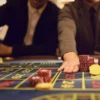Gambling has been prevalent in society right since the existence of humanity. Gambling has been a part of the culture in both western, Asian, and African societies. However, Betting is also regarded as a vice, and the biggest reason for such a view is that it is addictive, and people tend to lose money than profit from it.
Is Gambling A Vice?
The desire to recover the losses often provokes the player to wager more and, in the process, end up sustaining even more losses. This is one of the reasons why Betting is considered a vice in society. However, revenue generated by Wagering in the U.S. is many times more than the revenue accrued from selling movie tickets, theme parks, sports events, or musical concerts.
Gambling A Reality
More than 50 states in the U.S. have approved or legalized gambling in some form or another. It is another example of how Wagering is integral to our society. Betting has existed since antiquity, and it is a part of the culture in present times and will be a part of human culture in the future, also in perpetuity. It is, therefore, essential for sociologists to digest that Wagering has a significant impact on our lives. There are many positive aspects of gambling that must be considered before judging the advantages or disadvantages of gambling.
The theory that Gaming can act as a positive entity can be gauged from several happenings that profoundly affected society. In the renaissance era, the Catholics had underlined Gaming as a vice against the Protestants, who saw nothing evil in Wagering.
The Catholics considered the acts of gambling which gave people profits they did not toil for, as Satanic and evil. However, thinkers like Devereux elucidated the Gaming theory with the institutional approach, which proposed that Gaming had more influence on society than its distinctive and uncontrolled effects that were well known.
Revenue Generated By Gambling
In modern times, sociologists consider gambling as a sport, just like Chess or Golf, where millions of dollars are disbursed in games with high uncertainty. Many states have lotteries which is also a game of chance, but the returns are often used for several socially productive ventures. Many countries have legalized lottery and Gaming, which takes place under the watchful eyes of the betting and licensing board. They also state that Wagering, as an act, is a respectable leisure activity, just like any other type of entertainment.










